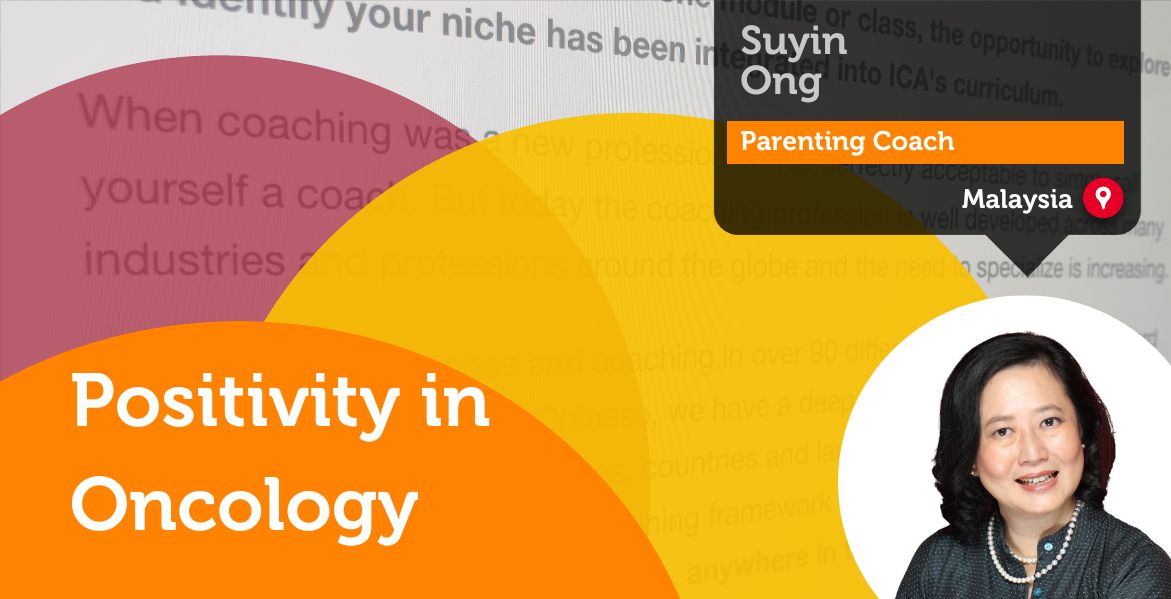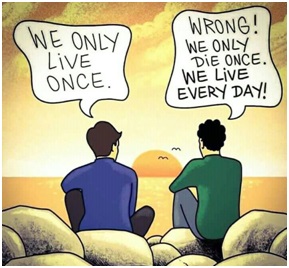A Research Paper By Suyin Ong, Cancer & Parenting Coach, MALAYSIA

The Power of Positivity in Oncology
Positivity is an outlook in life where we are optimistic (covers thinking positively, feeling positive emotions, and demonstrating positive behaviors like kindness and generosity). This is an outlook in life that has been an anchor to me as this has helped me throughout the ups and curveballs that life has thrown at me.
My dream is to enable the people that I encounter to live a positive and empowered life, regardless of what their current circumstances are. To that end, there is an entire range of topics that deal with the mental mindset of positivity from Positive Psychology, Positive Intelligence, Appreciative Inquiry, Gratitude, Emotional Intelligence, etc. This paper will focus on oncology-related, ie. those dealing with cancer.
Research on Positivity
Research is divided on how positivity impacts our lives. On one spectrum, research is convinced that positivity and health are intertwined where a positive attitude improves outcomes and life satisfaction across a gamut of conditions —including traumatic brain injury, stroke, and brain tumors[1]. Scientists are learning that the power of positive thinking is more than a catchphrase – it can rewire our brains to rewrite trauma and overcome negative thinking patterns. This concept of positivity is centuries old. The belief that changing our thoughts can change our reality is one of the foundations of Buddhist teachings and is also the core of cognitive behavioral therapy (CBT) and other scientifically backed therapy models.
As we reflect on life, we can reason that our cusp of power is in the present moment, where mental seeds are planted to create new experiences. We can choose to reframe our thinking when we feel “stuck”. With that, we can envision a more positive future be it more loving, healthier, and prosperous. On this side of the spectrum, research shows that when people have a positive mindset, performance on nearly every level—productivity, creativity, engagement—improves. Shawn Anchor[2] in his article, “Positive Intelligence” hypothesized that
People who cultivate a positive mindset perform better in the face of challenge. I call this the “happiness advantage.
Positive psychologist and author Dr. Sonja Lyubomirsky who studied happiness and its influence[3] suggest that we can guide our minds to a more positive perspective of our own choice which is empowering!
 What we allow our focus to concentrate on can enhance our mental well-being or destroy it. It does not mean that we look at the world through rose-tinted glasses and everything is wonderful. It means that we look at the situation set on finding the positive side of it. This can be likened to looking at this picture — is it half full or half empty[4]?
What we allow our focus to concentrate on can enhance our mental well-being or destroy it. It does not mean that we look at the world through rose-tinted glasses and everything is wonderful. It means that we look at the situation set on finding the positive side of it. This can be likened to looking at this picture — is it half full or half empty[4]?
What Is Positivity?
Being positive doesn’t equate to being happy or seeing the good in everything all the time. Positive thinking doesn’t mean burying our heads in the sand and ignoring life’s unpleasant situations. Positive thinking means tackling unpleasantness in an optimistic and constructive way where we think the best is going to happen, not the worst. As the saying goes “too much of a good thing can be bad” à when faced with a cancer diagnosis, being pressured by family members and friends to be too positive may impede open communication about the uncertainty, distress, and pessimism that are usually part of an actual mix of thoughts and feelings. At the end of the day, it is normal to have conflicting feelings. We need to be mindful of this so we can help our coachee allow these conflicting feelings to coexist. For these coachees, it could be:
- Cancer conveys loss, grief, and fear. You are a victim and suffering. OR
- Cancer conveys appreciation, change, and connection. You are a survivor and resilient.
What is the coachee’s stand on this? Could it be both? Our amazing minds can craft our reality because they can adopt different perspectives on a given situation. This insinuates that there are numerous “truths” in any given experience. It is vital to allow these truths to coexist. Our minds can create almost any story we choose. When we choose self-compassionate stories, it empowers us to create beneficial choices for ourselves. On the flip side, it can handicap us when we are self-critical or always focusing on the worst-case scenarios.
We need to be cognizant of other schools of thought that hypothesize that there is no scientific evidence to substantiate the idea that positive psychology interventions enhance or improve cancer patients’ prognosis by strengthening their immune systems [5]. Author Barbara Ehrenreich labels toxic positivity as “reckless optimism”. She explains that
it is important to prepare ourselves for life’s challenges, and the ever-cheerful outlook ….cannot accomplish this (Ehrenreich, 2010).
It is inevitable for us to deal with painful emotions and experiences. Those emotions, while unpleasant, are important and need to be felt and dealt with openly and honestly. The term “toxic positivity” has overgeneralized positive thinking. Toxic positivity may be more harmful to people facing challenges and obstacles. Instead of being able to openly share candid human emotions and get unconditional support, these people find their feelings dismissed, ignored, or outright invalidated.
 Here is where I can share experiences having gone through this and also support/coach others who have been through a cancer diagnosis. Being positive in this instance is not so much expecting full recovery or a change in mindset to rose-tinted glasses but more of understanding what is happening, taking stock of the situation, being at peace with it, and looking at the lens of “What can I do about it?”. This then gives the coachee the feeling of being in control. This feeling of being in control makes a lot of difference in attitude. When we feel we are in control, we can move forward and do something compared to when we feel we are not in control, we usually feel stuck and stagnated. However, if we just encourage our coachee to always think positively and not get them to explore their own feelings, we are doing them an injustice and invalidating their feelings.
Here is where I can share experiences having gone through this and also support/coach others who have been through a cancer diagnosis. Being positive in this instance is not so much expecting full recovery or a change in mindset to rose-tinted glasses but more of understanding what is happening, taking stock of the situation, being at peace with it, and looking at the lens of “What can I do about it?”. This then gives the coachee the feeling of being in control. This feeling of being in control makes a lot of difference in attitude. When we feel we are in control, we can move forward and do something compared to when we feel we are not in control, we usually feel stuck and stagnated. However, if we just encourage our coachee to always think positively and not get them to explore their own feelings, we are doing them an injustice and invalidating their feelings.
Negativity Bias
The real obstacle to positivity is that our brains are hard-wired to scan for threats. This survival tactic helped us way back when we were hunters and gatherers, living daily with the hazards of being killed by someone or something in our surroundings.
As maintaining positivity may be a continuing battle, we need to be intentional about staying positive to beat the brain’s tendency to concentrate on threats. Martin Seligmandescribes this as “Learned Optimism” (Seligman, 2006)[6]. Optimists are inclined to regard bad times as a temporary phase which means they rebound more quickly after failures or setbacks. Pessimists are more likely to contemplate negative events as permanent and unchangeable. Therefore, they tend to quit when things get tough.
How to Maintain Positivity?
-
Focus on the Positive
When faced with challenges, some people will identify things or circumstances they don’t want eg. “I don’t want to fail” or “I don’t want to die”. It is more empowering to look at what they want eg “I want to complete this ICA certification” Or “I want to live healthily to at least 70 years old so I can play with my grandkids”. Anthony Robbins says
Energy flows where the attention goes
as seeing and understanding the desired outcome will make us more determined to reach it. This is also linked to reframing (see 2).
-
Practice Reframing
Reframing is seeing the present situation from a different perspective, which can move the coach forward from a situation in which he/she feels stuck or confused. Reframing facilitates one’s mind shift to be more empowered to act and to learn at the same time. Reframing one’s perspective on a situation can help change how we feel about the situation. Although we may not “believe” our reframed situation, verbalizing it can help us feel more positive. As Albert Einstein says
The world we have created is a process of our thinking. It cannot be changed without changing our thinking.
|
Perspective Change / Shift |
Negative |
Reframing strategy |
|
Passive→Active |
I can’t do anything about this. |
What is one small step that you might take? |
|
Negative→Positive feeling |
I am losing so much hair from chemotherapy. |
What are the advantages of having less or no hair? |
|
Past→Future |
I feel so stuck now. |
If you may have anything or be anywhere by now next year, what would that be? |
|
Future→Past |
There is so much to do, I don’t know where to begin. |
Has there been a time in the past when you accomplished all tasks/goals you set? If so, what did you do then to be successful? How might you use that approach now? |
|
Others→Oneself |
My needs aren’t important right now. Too many people need me. |
What do you think will happen in a month’s time if you continue to ignore your needs? In 6 months? Where will you be next year if nothing changes? What will your physical health be like? Will you have the strength and energy then to care for others? |
|
Liability→Asset |
I’m such a perfectionist. |
How might being a perfectionist help you now? |
|
Victim→Victory |
That always seems to happen to me. |
How does holding on to the present belief serve you? |
-
Focus on What Is Within Our Control
In every challenge, there are areas that are beyond our control (eg. the past, economy, etc) and areas that we may have some control over. It’s more empowering to focus on what we can control and not pay attention to those we can’t control. We may not be able to control the environment and what goes around but we can control our responses to it.
-
Build Mental Muscles
In his book “Positive Intelligence”, Shirzad Charmain encourages us to build our mental muscles so we can quickly switch from a Saboteur mindset (negative) to a Sage (positive) mindset.
-
Cultivate an Attitude of Gratitude
There are usually some silver linings even in the worst circumstances. As Albert Einstein advised,
In the midst of every crisis, lies great opportunity.
Having a cancer diagnosis is not fantastic although we can tease out the positives. I for one, see my cancer diagnosis as a wakeup call to eat more healthily, exercise more and approach life at a more measured pace. We can ask “How can this order help me? What am I able to learn from this situation?” Research suggests many cancer survivors experience posttraumatic growth eg. they cultivate more compassion for others, appreciate life more, etc. When we examine the situation and choose to be thankful for the positive things (rather than just picking out the negatives and letting ourselves get drawn into self-pity), we will appreciate the greatness in our life!
-
Consider a Mantra
Self-affirmation can help us cope when an illness threatens our very integrity. Some people with cancer have learned to shift their negative thoughts in a positive direction by repeating a mantra or phrase. These affirmations can reprogram our subconscious mind to visualize a more positive situation.
-
Positive Surroundings
In addition to the positive people in our life, surrounding ourselves with positive energy such as inspirational books and uplifting music can add an extra touch of buoyancy to keep us afloat as we face challenges.
Positivity in Oncology: A Practical Guide
It can be a challenge to be happy in chaotic times. We may not be able to change our circumstances or emotions completely, but small shifts in perspective can help make gray skies a bit bluer with a touch of sunshine. At the end of the day, how we think about things affects our experience of them.
As one goes through cancer treatments, these positive psychology practices and knowing our strengths (as well as those of the people surrounding us) can help us create a diverse ecosystem that can help us shine and be cancer thriver (not just survivors!). As the late Stuart Scott said,
You beat cancer by how you live, why you live, and in the manner in which you live.
References
- Anchor, Shawn (Feb 2012) “Harvard Business Review: Positive Intelligence”
- Anchor, Shawn (2010) “Happiness Advantage”, Currency
- Chamine, Shirzad (2012) “Positive Intelligence” Greenleaf Bookgroup
- Cherry, Kendra (Feb 2021), “What Is Toxic Positivity?”
- Cormio, Claudia; Muzzatti, Barbara; Romito, Francesca; Mattioli, Vittorio; Annunziata, Maria A.; National Library of Medicine, “Posttraumatic growth and cancer: a study 5 years after treatment end”
- Forward in Heels, “The Simple Attitude Change That Will Dramatically Increase Your Quality of Life”
- Grainger-Valvano, Claire (March 2019) Oncology Nursing News “The Role of Positive Psychology in Oncology Practice”
- Hanson, Rick (Sept 2010), “Mind & Body: The Neuroscience of Happiness”
- Humphreys Marika (Sept 2021), ‘An Important Part of Cancer Caregiving That’s Often Overlooked and How to Prioritize It”
- John Hopkins Medicine, “The Power of Positive Thinking”
- Lyubomirsky, Dr. Sonja (2007) “The How of Happiness: A New Approach to Getting the Life You Want”, Penguin Books
- Matthews, Rod (July 2019) Learn to be more optimistic: PART 1”
- How being a cancer survivor has shaped my leadership coaching (strategy-business.com)
- Millacci, Tiffany Sauber, (Feb 2022) “Positive Psychology: Toxic Positivity in Psychology: How to Avoid the Positivity Trap”
- Roberge, Jackie (July 2015) “Practicing Acceptance”
- https://www.cancer.net/blog/2020-02/grief-andor-gratitude-choosing-your-truth-cancer-experience/
- Seligman, Martin (2011), “Learned Optimism: How to Change Your Mind and Your Life” Random House
- Silversides, Lani (Nov 2018), “How Strengths Helped Me on My Cancer Detour”
[1]John Hopkins Medicine, https://www.hopkinsmedicine.org/health/wellness-and-prevention/the-power-of-positive-thinking
[2]Anchor, Shawn, “Positive Intelligence”, Harvard Business Review
[3]Positive psychologist and author Dr. Sonja Lyubomirsky studies happiness and its influence. Her findings reflect that while 50% of happiness is in our genetic code and 10% is based on our life circumstances, 40% is self-determined and lies within each of us. Dr. Lyubomirsky also suggests that this 40% is underutilized, and we indeed have the ability to bring this 40% to its optimal level of functioning. (Sandra, 2007)
[4]We have all heard that the Chinese use the same word to describe the concepts of crisis and opportunity. What they mean to say is that in every crisis lies an opportunity, depending on how it is looked at. The word crisis comes from the Greek "to separate, to sift" which means to pass judgment, to keep only what is worthwhile. There is an opportunity in every crisis and the deeper the crisis, the better the opportunity can be. But some people are not capable of seeing it.
[5](https://www.ncbi.nlm.nih.gov/pmc/articles/PMC2858800/, 2010)James C. Coyne, Ph.D.and Howard Tennen, Ph.D. Positive Psychology in Cancer Care: Bad Science, Exaggerated Claims, and Unproven Medicine
[6] “Life inflicts the same setbacks and tragedies on the optimist as on the pessimist, but the optimist weathers them better.” Seligman, 2006, p. 312